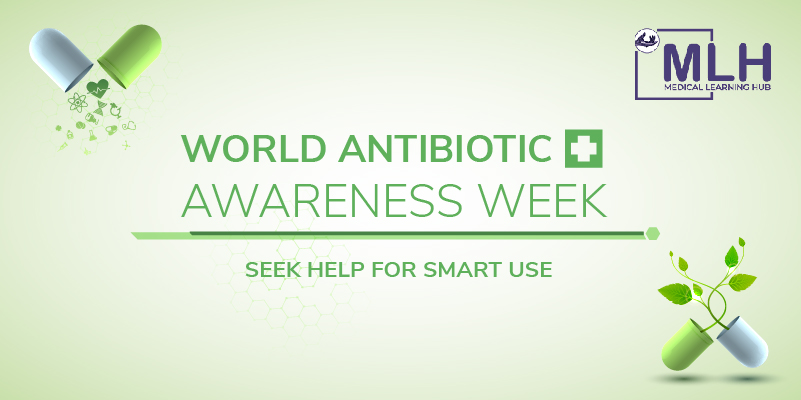World Antibiotics Awareness Week
World Antibiotics Awareness Week (WAAW) is celebrated every year from the 18th to the 24th of November. The main purpose of World Antibiotics Awareness Week (WAAW) is to shed light on antimicrobial resistance (AMR) around the world. WAAW also aims to promote safe practices among the general population and healthcare workers to curb the spread of antimicrobial infections. AMR refers to bacteria, fungi, viruses, and parasites becoming immune to the effect of medications, more specifically, antibiotics. This creates complications in the treatment of common infections, thereby increasing the spread of diseases on a global level. Excessive prescription of antibiotics and patients not completing their course of medication are two of the main causes of AMR today. However, the overdose of antibiotics in fish farming and livestock, the lack of new antibiotics, and the spread of infection in healthcare centres can also contribute to the spread of AMR.
How does antibiotic resistance spread?
There are two major scenarios causing the spread of antibiotic resistance:
1. An individual can directly develop antibiotic bacteria in his/her gut. When this individual visits a hospital which does not keep a check on their facilities and hygiene levels, the antibiotic resistance can spread to other patients, causing a chain reaction of sorts.
2. Just like humans, crops and livestock can also carry antibiotic-resistant bacteria. These bacteria could exist naturally or could result from an overdose of antibiotics in healthy animals & crops. Either way, when we consume these crops & livestock, the bacteria can be passed onto us. AMR bacteria can also be waterborne, spread through the soil, and even through direct contact with livestock.
Here are some effective ways through which you can handle antibiotic resistance:
For healthcare workers:
- Ensure the vaccinations of your patients are up-to-date.
- Give a prescription of antibiotics only when needed.
- Always use clean instruments.
- Make sure you work in a sanitized environment in order to stop the spread of
infections.
- Be precise in prescribing the right dosage of the antibiotic for the required
tenure.
- Always conduct tests to confirm the kind of antibiotics your patient needs.
For the general population:
- Complete the course of the prescription even if you feel better midway.
- Only trust the use of antibiotics if it is prescribed by a healthcare professional.
- Keep yourself sanitized to avoid the spread of infection.
- Throw away any leftover antibiotics.
For this year, the theme of World Antibiotics Awareness Week is “United to preserve antimicrobials”. With this, the main objective is to educate the masses about antimicrobial resistance with effective communication and training. The ultimate goal will always be to stop the spread of AMR through safe practices.
A la Une
Riposte contre la COVID-19 et la lutte contre la vulnérabilité. iposte COVID-19 et la lutte contre la vulnérabilité
Cette thématique vise à développer les capacités des acteurs communautaires pour accompagner les pays SWEDD dans la riposte à la maladie de la COVID-19 et la lutte contre les vulnérabilités des femmes et des filles.
Lire +
MEDIATHEQUE
Gestion de la santé de l’hygiène menstruelle
Gestion de la santé de l’hygiène menstruelle
Gestion de la santé de l’hygiène menstruelle
Gestion de la santé de l’hygiène menstruelle
Partenaires

Les Autres Thématiques E-learning Autres Thématiques E-learning Swedd
Lorem ipsum, or lipsum as it is sometimes known, is dummy text used in laying out print, graphic or web designs.
Lire +
Les Autres Thématiques E-learning Swedd
Lorem ipsum, or lipsum as it is sometimes known, is dummy text used in laying out print, graphic or web designs.
Lire +
Les Autres Thématiques E-learning Autres Thématiques E-learning Swedd
Lorem ipsum, or lipsum as it is sometimes known, is dummy text used in laying out print, graphic or web designs.
Lire +
Les Autres Thématiques E-learning Autres Thématiques E-learning Swedd
Lorem ipsum, or lipsum as it is sometimes known, is dummy text used in laying out print, graphic or web designs.
Lire +
 Chaine D’approvisionnement
Chaine D’approvisionnement Décrochage Scolaire
Décrochage Scolaire Hygiene Menstruelle
Hygiene Menstruelle Violence Basée Sur Le Genre
Violence Basée Sur Le Genre Violence Basée Sur Le Genre
Violence Basée Sur Le Genre
Comments